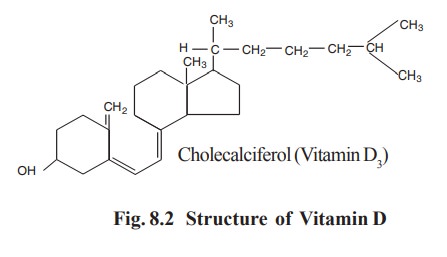Chapter: Biochemistry: Vitamins
Vitamin D
Vitamin
D
There are two distinct forms of Vitamin D
Cholecalciferol (Vitamin D3) is the
natural form of the vitamin occurring in foods (Fig. 8.2). It can be formed
under the skin from 7 dehydro cholesterol by the influence of sun light (ultra
violet (UV) radiation)
Ergo calciferol (vitamin D2) is a
synthetic form of the vitamin which has the same activity as the natural
vitamin. It is produced by the UV radiation of ergo sterol, a compound which
can be extracted from yeast. This is the form of vitamin which is added to
commodities such as margarine and baby foods.

Functions
Vitamin D is necessary for the growth and
maintenance of bones and teeth. Vitamin D helps in the absorption of calcium
and phosphorus from the small intestine and for the uptake of calcium and
phosphorus by the bones and teeth.
Sources
Vitamin D is not widely distributed in nature
and the best sources are fish oil, especially liver oil. Milk, butter and egg
yolk are the only foods in the ordinary diet that contain vitamin D.
Requirements
It is difficult to make standard recommendations
for the dietary requirements of vitamin D since the amount of vitamin D
produced in the body by the action of sunlight varies from person to person.
Many people may obtain this vitamin from sunlight. It is, however certain that
babies and growing children require more vitamin D than adults, due to rapid
growth and bone development.
Infants and children - 400 IU / day
Adults - 200 IU / day
Pregnant and lactating women - 400 IU/day
Absorption and storage
Fat helps in the absorption of vitamin D and
bile is essential for its absorption. Vitamin D enters into the general
circulation via lymph and stored largely in liver and kidneys.
Deficiency
Children receiving an inadequate supply of
vitamin D develop rickets. Calcium
and phosphorus are inadequately deposited in the bones. Premature infants are
more susceptible to rickets than full term infants. In adults on inadequate
supply of vitamin D causes osteomalacia,
a condition in which the bones become soft, weak and painful.
Related Topics